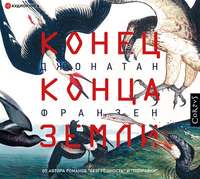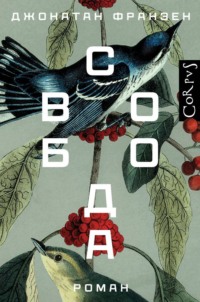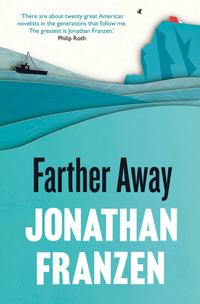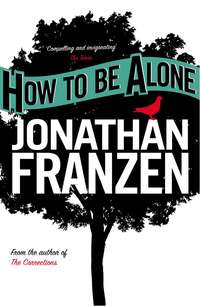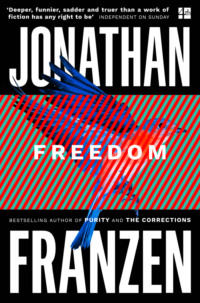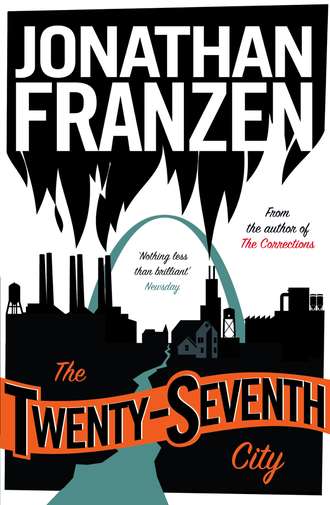
Полная версия
The Twenty-Seventh City
Spilling out along the front window of Dexter’s was a crowd of party people, loud people in their early twenties, people who instinct told Luisa weren’t professionals or good students. They clutched drinks. They laughed, their hairdos frosted flamingo pink by the glaring neon logo. Luisa looked in through the window. The place was packed. She hesitated, nervous, her hands in her pockets.
A man in a white shirt like hers had stepped out of the crowd. He had a foreign face, she almost guessed Algerian, except he was too decent-looking. He raised his eyebrows as if he knew who she was. She gave him a feeble smile. He spoke. “Are you looking—”
But her heart had jumped and she’d pushed through the doorway, hopping a little to keep her balance in the undergrowth of feet and shins. She squirmed and ducked laterally, listening for French. All she heard was English. Every word was a laugh. In every partying cluster there seemed to be one stocky woman, shorter and more flushed than the rest, who kept joking through her drink and almost spraying it. Near the blunt corner of the bar, where the crowd knotted up tightly, Luisa came to a dead stop. She wasn’t tall enough for a good view of the tables and booths, and she couldn’t move to reach them. And somebody hadn’t taken a shower this morning. She blocked her nose from inside and inched closer to the bar. Here she recognized a face in profile, but it wasn’t Paulette. It was a boy from high school. Doug? Dave? Duane. Duane Thompson. He’d graduated two years ago. He had both hands on the bar and a beer in front of him. He turned, suddenly, as if he felt her looking, and she gave him a feeble smile. His smile was even feebler.
She stuck her elbow in a fat man’s midriff and forged into the sitting area. Now she could see all the tables and still no Paulette. A waitress came careening by. “Excuse me—” Luisa caught her arm. “Is there a group of French people in here?”
The waitress opened her mouth incredulously.
Luisa had that sinking stood-up feeling in her stomach. She figured it was time to go back home, and she would have left if the Algerian hadn’t had his face pressed up against the front window. He was still acting like he had something in particular to say to her. As creeps went, he was handsome. She turned back to the tables, and then to the bar. Duane Thompson was staring at her. All this attention! She pushed her way to the bar, ducked under a shoulder, and faced him. “Hi,” she shouted. “You’re Duane Thompson.”
“Yes.” He nodded. “You’re Luisa Probst.”
“Right. I’m looking for some French people in here. Have you seen any French people?”
“I just came in a couple minutes ago.”
“Oh,” she shouted. She cast a futile glance into the haze. When she was a sophomore, Duane Thompson had been a senior. He’d gone out with a girl named Holly, one of those artsy liberal types who wore brocaded smocks and no bra and didn’t eat lunch in the cafeteria. Duane had been blond, shaggy, thin. He’d had his hair cut since then. He was wearing a jean jacket, a preppy button-down, black Levi’s and white sneakers. Luisa also noticed that he had the yellowish remains of a black eye, which made her uneasy. If you didn’t see a person every day in the hall or cafeteria, you didn’t know what kind of life they had, what kind of problems.
“Is there another room?” she shouted.
Duane spun around, surprised. “You’re still here.”
“Is there another room downstairs or something?”
“No, this is it.”
“Can I stand here with you?”
He looked down his shoulder at her, smiling as he frowned. “What for?”
Insulted and unable to answer, she took a step towards the door. The Algerian was hanging just outside, watching her. She gave him a vomitous look, took a step back, and plunked her elbow down on the bar. A bartender in a shiny shirt stopped in front of her. “I can’t serve you,” he said.
“What about him?” Luisa cocked her head towards Duane.
“Him? He’s a friend.”
“You’re not twenty-one, are you?” she asked Duane.
“Not exactly.”
The bartender moved away. It was time for Luisa to leave. But she didn’t want to go home.
“Are you waiting for somebody?” she asked Duane.
“No, not really.”
“You want to walk me to my car?”
His expression grew formal. “Sure. I’ll be glad to.”
Outside, after all the smoke, the air tasted like pure oxygen. The Algerian had left, probably to hide in the back seat of Luisa’s car. She and Duane walked in silence down Euclid. She wondered whether he was attached to someone.
“So,” she said, “do you, like, live around here?”
“I have an apartment near Wash U. I just moved out of a dorm.”
“You go to school there?”
“I did, but I dropped out.”
He didn’t look like a dropout, but she was cool enough to say only, “Recently?”
“A week ago Tuesday.”
“You really dropped out?”
“I barely even matriculated.” He was slowing down, perhaps wondering which of the cars parked on Euclid was hers.
“Don’t you love that word?” she said.
“Yeah,” he said, not sounding like he loved it. “They gave me sophomore standing for my year in Munich—I was in Munich last year.”
“I just got back from Paris.”
“Was it fun?”
“Oh, non-stop, non-stop.” Luisa nodded him into the alley.
“This is your car?”
“Sorry, but. It’s my mother’s.” She stuck her hands in her back pockets and looked into his face. There was a meaningful pause, but it went on too long. Duane was very cute, his eyes deep-set and blackened in the dim light. She remembered the bruise. “What’d you do to your eye?”
He touched his eye and turned away.
“Or shouldn’t I ask.”
“I ran into a door.”
He said this as if it was a joke. Luisa didn’t get it. “Well, thanks for walking me here.”
“Sure, you bet.”
She watched him head back up the alley. What an obtuse person. Luisa would have jumped at the chance to jump in a car with someone like herself. She unlocked the door and got in, started the engine, gunned it. She was quite annoyed. Now she had to drive home and sit around and watch TV and be bored. She hadn’t even explained what she was doing down here in the first place. Duane probably thought she’d come looking for a fun time and was going home disappointed. She drove up the alley and turned onto Euclid and pulled up towards the bar.
Duane was on the sidewalk, smoking a cigarette. Luisa pressed the button for the passenger-side window. “You need a ride someplace?” she yelled.
He reacted with such surprise that the cigarette sprang sideways from his hand and hit a building, showering orange sparks.
“You need a ride someplace?” she said again, stretching painfully to keep her foot on the brake while she leaned and opened the door.
Duane hesitated and then got in.
“You scared me,” he said.
She stepped on the gas. “What are you, paranoid or something?”
“Yeah. Paranoid.” He leaned back in the seat, reached out the open window, and adjusted the extra mirror. “My life’s gotten kind of weird lately.” He pushed the mirror every which way. “Do you know Thomas Pynchon?”
“No,” Luisa said. “Do you know Stacy Montefusco?”
“Who?”
“Edgar Voss?”
“Just the name.”
“Sara Perkins?”
“Nope.”
“But you knew who I was?”
He stopped playing with the mirror. “I knew your name.”
Well then. “I remembered you and what’s-her-face.” Luisa held her breath.
“Holly Cleland? That was years ago.”
“Oh. Hey, where are we going?”
“Take a left at Lindell. I live right off Delmar in U-City.”
So she was driving him home. They’d see about that.
“I didn’t pay for my beer,” Duane said.
She decided to let him live with that remark. She drove augustly, queen of the road, up Lindell. The silence crept along the floor between them. A minute went by.
“So are you still paranoid?” she said.
“Only around doors.”
“What?”
“Doors.”
“Oh.” She wasn’t following.
Duane cleared his throat. “What kinds of things are you taking?”
“Taking?” she said coolly. They were in downtown University City now, riding a wave of green lights.
He cleared his throat more strenuously. “At school.”
“Are the open windows bothering you?”
“No.”
“We can close them.”
“No.”
“I was kind of mad about the frost last week.” She just tossed this out. “It destroyed most of the bugs you can catch with a net. Basically I’m a net person. I mean, when I’m collecting. I had entomology last fall, and if you’re good with nets you can really prosper. But Mr. Benson started thinking I was his protégée or something. He came up to me in April and he asked me if I wanted to go collecting larval stages with him. Larvull stages. I’d hardly talked to him since first quarter. He thought it was some kind of treat. He was asking me to go collecting larval stages, because of my special interest in bugs.”
Duane craned his neck.
She guessed they were passing his street. “So we go out at about six in the morning to this pond near Fenton, and the first thing I think is oh god he’s going to molest me and dump me in the pond. He’s kind of creepy-looking to begin with. I could just see the headlines, you know, BUGGER BUGGERS BUGGER, DROWNS HER IN LAKE.”
She’d thought this up in April. Duane laughed.
“But instead he just gives me these special rubber boots that are about forty sizes too big for me, and then we start wading into this gloop with his special device for collecting larvae. He dips down in the water—I mean, it’s absolute gloop, I think no wonder it’s full of bugs. He dips down and the first thing he drags up is this disgusting little organism, I don’t know, some rare gadfly larva, which he shoves in my face and says, ‘Would you like to have it?’ Special treat, see. I’m about to woof it. I say, ‘That?’ I’ve probably mortally offended him, which is fine with me because it means he’ll never invite me again. With larvae and me, it’s no thank you. The first thing he’d said was, he’d said, ‘I think this will be very interesting for you. To pursue entomology properly you have to collect all the stages.’ I didn’t have the heart to tell him that’s exactly why I’ll never pursue entomology.”
“What about caterpillars?”
“They’re larval. They squish.”
The frosty glow of a Hammaker Beer sign flashed by on the right, trailing a liquor store. Luisa pulled over and braked to a hard stop by a hydrant. “Buy some wine?” she said.
Duane looked at her. “What color?”
“Blanc, s’il vous plaît. Something with a screw cap.”
She turned the car around and met him across the street. In a bag in the back seat there were big paper cups. She poured some of the Gallo into two of them and handed one to Duane. He asked where they were going.
“You tell me,” she said. Traffic sounds filled the car, the continuous kiss of tires and asphalt.
“My decision-making apparatus is paralyzed.”
“You talk funny.”
“I’m nervous.”
She didn’t want to hear about it. “What happened, you run into another door?”
“I’m not used to being out with people like you.”
“What kind of people am I?”
“Ones who go to dances.”
She blinked, unsure whether this was meant as a compliment, and put the car in gear. They’d go hit the warehouse site.
“What schools are you applying to?” Duane cleared his throat as though the question had left junk in it.
“Stanford, Yale, Princeton, Harvard, Amherst, and—what? Swarthmore. And Carlton. Carlton’s my safety.”
“Do you know what you’ll study?”
“Biology maybe. I guess I wouldn’t mind being a doctor.”
“Both of my parents are doctors,” Duane said. “And my brother’s in med school.”
“My father built the Arch.”
Ulp.
“I know,” Duane said.
“Did people talk about it at Webster?”
He turned to her and smiled blandly. “No.”
“But you knew.”
“I read the paper.”
“Is that why you remembered me?”
“You just never let up, do you?”
For a second she didn’t breathe. She made a right turn onto Skinker Boulevard, feeling agreeably mortified, like when her mother criticized her.
A cigarette lighter rasped.
“You shouldn’t smoke,” she said.
“Clearly.” Duane flicked sparks out the window. “I haven’t been smoking long. Like a month and a half. I came back from Germany and got grossed out by how conceited people are about their health. My family especially. I figure as soon as I’ve gotten Webster Groves out of my system I’ll kick the habit. In the meantime it’s kind of entertaining. These keep me company when I’m alone.”
“Then what are you smoking one now for?”
He threw it out the window. Luisa followed an Exxon truck onto Manchester Road. To the right, ambiguous amber signals glowed along railroad tracks on an elevated grade. Four blocks further east she swerved off the road. Gravel flew up and hit the chassis of the car. She drove back between a pair of metal sheds.
“Where are we?” Duane asked.
“Construction site.”
“Hey.”
She cut the lights. The chalky moonlit whiteness of the area leaped into prominence. On black trailers beyond the chain-link fence, tall red letters spelled out PROBST. Duane took a small camera pouch from his jacket pocket and got out of the car. Luisa followed with her paper cup of wine. “What’s the camera for?”
“I’m sort of a photographer.”
“Since when?”
“Since, I don’t know. Since a few weeks ago. I’ve been trying to sell some things to the Post-Dispatch.”
“Have you had any luck?”
“No.”
There was enough slack in the chain on the gate to let them slip through easily. They walked down a set of wooden steps to the warehouse skeleton, which was three hundred feet long and nearly that deep. Vertical steel members punctuated the structure every twenty feet or so, and here and there a prefabricated staircase rose pointlessly to the top plane of beams. Light bulbs were strung on posts above the foundation.
“You can’t take pictures here.”
“Why not?”
“We’re not supposed to be here.”
All around them lay hasty piles of plywood pouring forms and bundles of reinforcing rods, knobby and sagging. Duane’s sneakers made soft pings on the undamped metal as he ran up a staircase. Luisa thought of her parents at the movies. They’d gone to see Harold and Maude. She imagined her mother laughing and her father watching stone-faced.
Through the iron parallelograms above her she could make out the W of Cassiopeia. To the south, two vertical strings of TV-tower lights competed in the night like the stations they belonged to. Trucks rumbled by on Manchester Road, and Luisa swayed in the darkness, and drank her wine, her eyes on Duane.
The next morning she woke up at seven o’clock. Her father was leaving for work and then tennis, his Saturday routine, and she could hear him whistling in the bathroom. The tune was familiar. It was the theme from I Love Lucy.
In the kitchen she found her mother reading the stock-market pages of the Post, her coffee cup empty. She was chewing her nails as she had every morning for the last nine years in lieu of a cigarette. “You’re up early,” she said.
Luisa dropped into a chair. “I’m sick.”
“You have a cold?”
“What else?” She reached for a waiting glass of orange juice and coughed decrepitly.
“You were out pretty late.”
“I was with this guy from school.” She explained, in sentence fragments, what had happened at the bar. She rested her face on her palm, her elbow on the checkered tablecloth.
“Were you drinking?”
“This is not a hangover, Mother. This is the real thing.”
“Maybe you should go back to bed.”
She didn’t want to. Her bed was burning hot.
“Can I make you some breakfast?”
“Yes please.”
She was in her room watching Bullwinkle when her father returned from the courts. He was still whistling the theme from I Love Lucy. His face appeared at her door, pink with tennis. “Your mother tells me you’re sick.”
She rolled onto her back and made an effort to be friendly. “I’m feeling a little better now.”
“Getting up is always the worst.” Daddy was sententious.
“Uh huh. Did you win?”
He smiled. “Your uncle’s a very good player.” His eyes grew distant, his smile false. Uncle Rolf always beat him.
“How was the movie?” she asked.
“Oh, very funny. A good choice. Your mother loved it.”
“What about you?”
“I liked the Maude character. She was very well done.” He paused. “I’m going to take a shower. Will you be down for lunch?”
Sick of records and TV, she spent the early afternoon simply kneeling by the window, her chin on the cleft between her clasped fingers. The trees were in motion, and puffy white clouds were in the sky. Mr. LeMaster across the street was doing his best to rake leaves. A man in a blue van threw the weekend Post-Dispatch into the driveway. Luisa went down to fetch it.
Her father was on his business line in the study, ordering eighteen beef Wellingtons for some kind of meeting. Her mother was baking in the kitchen. Luisa heard the rolling pin click and the cadences of the three o’clock news.
The air outside was both warm and cold, like fever and chills. Mr. LeMaster, who thought she was spoiled, did not say hello.
She unsheathed the Post and left all of it at the foot of the stairs except for the big funnies and the Everyday section, which had the small funnies. These she took back up to her bedroom and lay down with. She started to turn to the small funnies, but a picture on the first page stopped her. It was a picture of a black man giving the photographer the finger. The credit read: D. Thompson/Post-Dispatch.
Luisa shivered. How could they print a picture like that? And so quickly? Duane had said he hadn’t sold anything.
A FOREST PARK SATURDAY was the page’s headline. Other pictures gave glimpses of anonymous revelers, and in the background of Duane’s picture some kids were playing football on the field by the Planetarium. The lips of the man in the foreground were parted in derision. His finger was aimed at the unseen photographer. Shirts and Skins in the Park, the caption read. Benjamin Brown, foreground, has been unemployed since last November. The man, right, was unidentified.
The man, right, was a hawk-nosed Asian in a turban, a passerby. He was glancing aside so severely that his eyes were all whites. He looked like a blind man.
Eight hours later she and Duane were necking in the rain in Blackburn Park. When the rain got too heavy they went and necked in his mother’s silver Audi, which he’d borrowed for the evening. The windows fogged up solid. People walking by on Glendale Road couldn’t see a thing inside the car.
Luisa was running a temperature, maybe a hundred or a hundred one, but she didn’t feel the least bit sick. It was Duane who kept asking if she had to get home. When she did get home, the house was dark; she was happy she was only an hour late. But as soon as she closed the front door her father ambushed her. First he scared her and then he was horrible to her. She couldn’t understand how anyone could get so pissed off about an hour either way. Before she fell asleep she decided to keep Duane to herself for a while, even if she had to lie.
When she woke up in the morning the sun was shining and the air near her bedroom windows was much warmer than it had been the night before. After breakfast she told her mother she was going out birding with Stacy. She told her father she thought his pants were too short. Then she drove over to University City and picked up Duane, and phoned Stacy from a gas station and asked her to cover for her.
In the middle of the big field in Washington State Park she spread a blanket and lay down. Half a mile away, further up the Big River valley, smoke was uncoiling from dying fires. Campers were pouring water on the coals, packing tents into trunks. For them it was the hour of damp sleeping bags and desolation, their thoughts turning to tomorrow’s practicalities while Luisa beamed in the sun. Her new boyfriend’s eyes were bright. He’d slept well, he said. He’d brought a camera, a larger one, a Canon.
“Psh-psh-psh-psh-psh-psh-psh-psh-psh-psh.”
“What’s that?”
“Birds like it,” she said. “Psh-psh-psh-psh-psh-psh-psh. Psh-psh-psh-psh-psh-psh-psh-psh.”
“What birds?”
“All birds. They get curious. They wonder what it is. Look!” She pointed to a red-and-white flash in the willow grove.
“What?”
“Rufous-sided towhee. It’s one of my favorites.”
“How many—”
“Sh! Sh-shh-shh-shh-shh-shh-shh-shh.”
“How many species do you know?” Duane whispered.
“I’ve seen a hundred twelve this year. I’ve got about a hundred and fifty on my lifetime list. Which isn’t very many, really.”
“It sounds like a lot.”
“Does it?” She leaned into him and toppled him. “Does it? Does it?” Sickness and medicine made her feel spread out, a warm smothering blanket. “Does it? Does it?” She spread her arms and legs to mirror his. His hard-on pressed on her hipbone. They lay still for a long time. Luisa could see herself and how she lay and looked from a perspective that would have been impossible if her parents had known who she was with. At this very minute in Webster Groves her mother was working on dinner and her father was watching football. They expected her back before long.
“Listen!” Duane shifted beneath her.
Geese were honking. She rolled over and saw a V of Canadas heading south. She sneezed from the sun and wool dust.
“Sit up for a second,” Duane said. He was screwing a stumpier lens onto the camera.
“You mean gesundheit.”
He lay on his stomach and took half a dozen pictures. “What kind of geese are those?”
She turned to double-check.
“Don’t look. Smile. Wipe that mustache off your face.”
She smiled at the receding geese. “Am I going to be in the paper?”
“Smile. You’re a dream. At me.”
“At you?” She stopped smiling and looked at him. “What for?”
“So nobody gets the idea they’re looking at anything but a picture. I want there to be an implied photographer.”
“I guess you’ve got it all figured out,” she said.
“I guess I do.”
“Is that what you told the Post-Dispatch?”
“I didn’t tell them anything. I went down there with some prints and they gave me the runaround. And then yesterday morning, like, you’re putting me on the payroll? I thought they were going to say they’d lost my pictures.”
“You’re really lucky.”
“I know. You’re my lucky star. I can pay the rent now.”
Rent? What a bizarre concept. Pay the rent. What a boring concept.
“Do you like me?” she said.
“What do you think?”
“Why do you like me?”
“Because you’re smart and you’re pretty and you came along at the right time.”
“Do you want to go back to your apartment?”
“Later maybe.”
“Let’s go now. I have to be home at six.”
4
Behind the first tee of the 18-hole Forest Park golf course, the starter emerged from his hut and called two names.
“Davis and White?”
RC White and his brother-in-law Clarence Davis rose from a bench and retrieved their cards.
“Twosome,” the starter said, disapproving. He fixed his eyes on his left shoulder. He had no left arm.
“We play slow,” RC averred. “We’re patient men.”
“Uh huh. Just wait till the kids up there hit again.”
“We appreciate it,” Clarence said.


